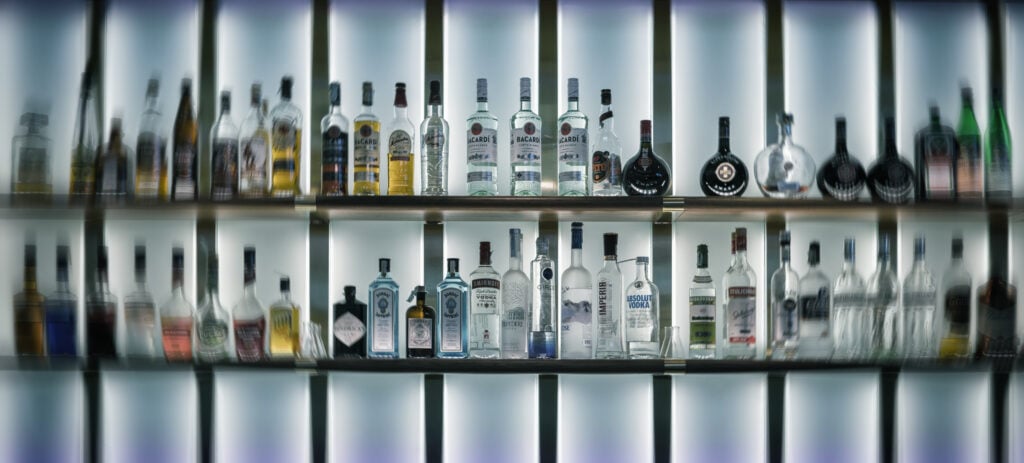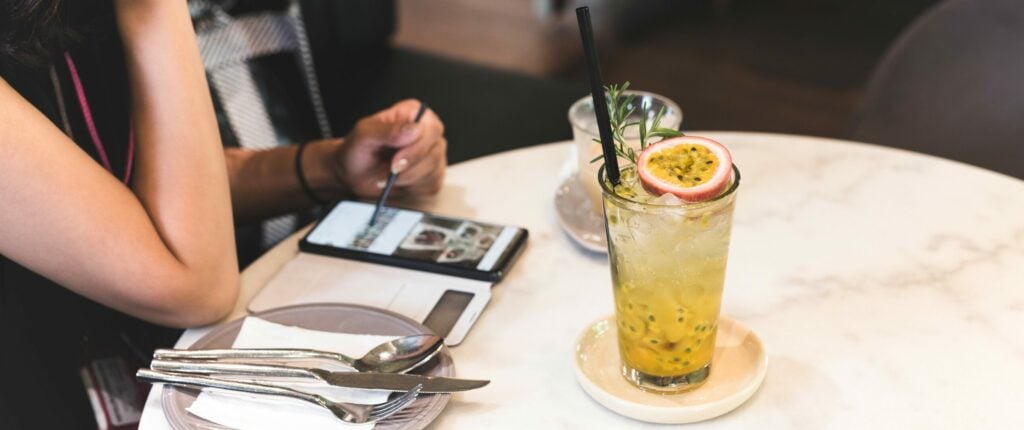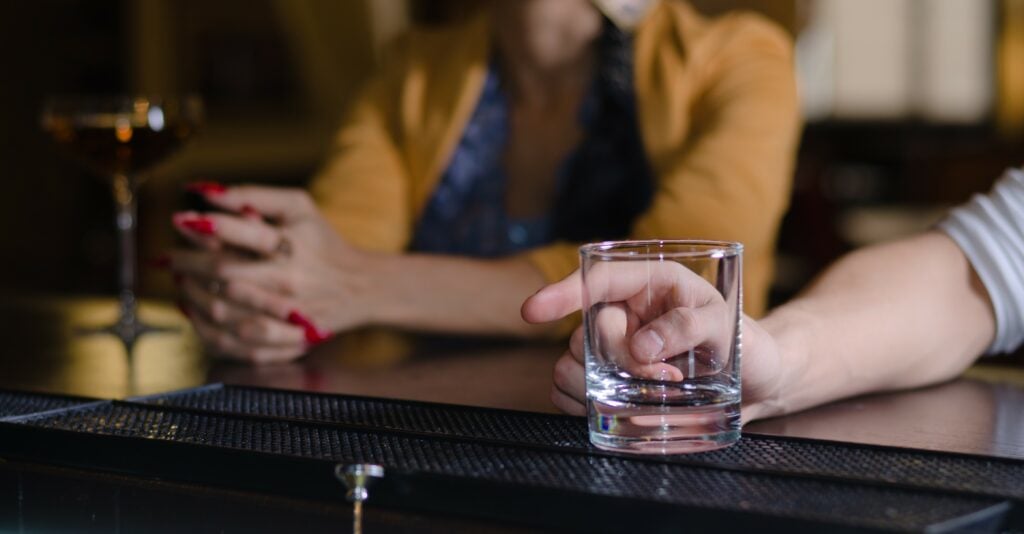Are you sober curious?
Reviewed by Susan Radzilowski, MSW, LMSW, ACSW


Hannah, a 37-year-old ultrasound technician from Philadelphia, remembers the day she decided to explore her relationship with alcohol. It was August 13, 2023.


“My husband was leaving for a golf trip, and I had to call him to come home because I was experiencing one of the worst panic attacks I’d ever had,” Hannah says. “I thought I was going to die. This lasted for about six hours straight. I stared at my young daughter, feeling half-alive, while she was sitting on the couch, giggling and watching a movie. In that moment, I knew it was time to do something.”
Hannah doesn’t remember a time when she didn’t experience anxiety and panic, but it had been getting worse that summer. She’d tried to take care of herself in a number of ways—going to therapy, exploring mind-body techniques, and changing what she ate—but nothing seemed to help. The only option she hadn’t investigated was quitting alcohol altogether. When she did, Hannah was shocked to discover the role booze had been playing in her life.
What does it mean to be sober curious?
If you’ve been on social media in the past few years, it’s likely you’ve seen hashtags for trends like Dry January and No Drink November. But lately these dedicated months have been replaced by something more permanent: sober curiosity.
The term “sober curious” was coined by author Ruby Warrington in her 2018 book of the same name. It refers to a short period of time in which a person abstains from alcohol. Sober curiosity is a growing movement among young people, particularly Millennials and Gen Zers, and it’s changing their relationship with drinking.1
Sober coach Beth Bowen, LMSW, says that the appeal of sober curiosity has been driven by a period of self-reflection. “Young people are acknowledging that they’ve been socialized to believe alcohol is a necessary part of life,” says Bowen. “This movement gives them the chance to ask if that’s really true for them as individuals, and to collect their own data and make a decision for themselves.”
Bowen says sober curiosity resonates with younger generations because they have more information at their fingertips. “They know the dangers of alcohol in the same way older generations came to learn about the dangers of smoking, then slowly turned their backs on that industry,” she explains.
The data proves out this point: Not only are younger generations drinking less often, but people age 35 and under are less likely to overdrink than earlier generations did at that age.2 In addition, more than half of young adults believe even moderate drinking is unhealthy—a 34% increase from only five years ago.
Challenging misconceptions
Sober curiosity is helping to debunk some longstanding myths about alcoholism, substance abuse, and sobriety.
Myth: You can’t have a social life as a sober person
One of the stumbling blocks to sobriety is the social aspect of drinking. Grabbing a drink has been ingrained in pop culture for generations, and it’s central to how many people practice friendship. In the era of sober curiosity, that’s starting to change.
In the recent past, if you went to a bar with friends and chose not to drink, you could expect to be peppered with questions—or, says Bowen, people would assume you had a problem with alcohol abuse, which can still carry stigma. “Sober curiosity gives people the permission to really examine how alcohol shows up in their lives, and whether or not it benefits them, without the social stigma of alcoholism,” she says.
Across the country, restaurants and bars are offering more alcohol-free drinks, including mocktails. In 2017, an alcohol-free bar in Texas made headlines when it opened; today, there are dozens all over the US.3, 4 There’s even a burgeoning trend called dry dating where people remove all substances from their romantic lives to help themselves make clear, intentional choices.5
Myth: You must hit rock bottom before finding sobriety
“How people are looking at addiction is so different now than it was a decade ago,” Bowen says. The conventional wisdom used to be that alcohol had to be an overtly destructive force in your life, sometimes even causing you to hit “rock bottom,” before it was time to get sober. But today, Bowen explains, addiction is viewed as a broader spectrum.
Hannah had suspected her relationship with alcohol was potentially unhealthy. But because she hadn’t hit rock bottom, she wasn’t sure if she had a problem—and people in her life reinforced that uncertainty.
“For years, I expressed my fears of abusing alcohol, but everyone reassured me that I didn’t have a problem because I got up and went to work every day, or I was an ‘awesome mom,’ or I deserved a break,” she says. This is what our binary view of addiction does, Bowen confirms: It traps people in a state of surviving, not thriving.
Myth: You have to be deeply addicted to get treatment
Treating addiction as a spectrum allows for more early intervention, says Bowen. “We talk about early intervention in so many other aspects of health, but we need to start talking about it in terms of substance use,” she says. “We don’t talk about needing to stop or having the opportunity to stop using a harmful substance until it gets ‘bad enough.’”
Sober curiosity gives people the chance to take a break from alcohol if they feel it might be unhealthy—even a little bit. Bowen encourages her clients to think of addiction like a one-way train. If you can stop it early enough, it doesn’t get away from you.
Whether you’re struggling with addiction or just curious about what sobriety might feel like, working with a mental health professional can help. Search our directory to find a therapist near you. Having extra support during a sober period can help you process your feelings in a meaningful way.
How sober curiosity can lead to sobriety
Sober curiosity isn’t the right fit for everyone. “Those who need medical detox, for example, require medical intervention to get sober safely,” says Bowen.6 But for many, temporary sobriety can help reveal whether moderation is an option. If you’re struggling to get through a sober month or even a week, that can help you make an informed decision.
“I’m someone who can’t moderate,” Bowen says. “I started with a sober month and found it really difficult to finish. That gave me a lot of information, and I realized I needed to consider sobriety.”
A short period of sobriety also affords space for building life skills like stress management and self-care, which Bowen says are at the heart of healing from addiction. “I truly believe sobriety has a lot less to do with willpower and more to do with building skills and resilience,” she says. “Sober periods provide you with a space to practice being a sober person. You can try and fail and try again while gathering data on what works and what doesn’t along the way.”
Benefits of temporary sobriety
Whether or not you have an addiction to alcohol, a sober period can offer immediate benefits, including better-quality sleep, more energy, and a break from hangovers. Longer-term sobriety can reduce your risk of cancer, lower your anxiety, increase your confidence, and help you manage stress better.7, 8
Hannah says that within a few days of abstaining from alcohol, she was overcome by how much better she felt. “I was sleeping so deeply and waking with calm, not anxiety. Cooking, cleaning, and laundry were no longer obstacles to be tackled and rewarded with alcohol. I was loving the fact that these mundane experiences were meaningful.”
Sobriety also made an immediate impact on Hannah’s relationships to other people—and to herself. “I felt present for the first time in a long time for my family,” she says. “I’m also physically in the best shape I’ve been in since my early twenties. I exercise out of enjoyment.” With all these motivations in mind, Hannah knew that she wanted to continue her sobriety.
Setting yourself up for success
If you’re interested in trying a sober period, Bowen recommends plugging into the many resources available for sober living. “We used to send people to Alcoholics Anonymous (AA) when they were struggling with addiction, and that’s still an amazing resource, but there are so many other options,” she says. “There’s an entire genre of ‘quit lit’ [memoirs and self-help books about sobriety], supportive podcasts, and all different flavors of support groups.”
Hannah has built a supportive network of friends and family, as well as online groups, and she’s grateful for her new outlook. “When I was 21, it was all about hitting the bars—and if you weren’t drinking, people looked at you like an outcast,” she says. “Now I have friends asking me about my sober-curious journey, and I support them where I can. It’s more acceptable than ever to make informed decisions for your own life, and I’m so glad I did.”
To get professional support as you explore your relationship with alcohol, browse our therapist directory.

Sources
1 https://www.prnewswire.com/news-releases/nearly-4-in-10-us-consumers-closely-or-occasionally-follow-a-sober-curious-lifestyle-301840007.html
2 https://news.gallup.com/poll/509690/young-adults-drinking-less-prior-decades.aspx
3 https://abcnews.go.com/Lifestyle/alcohol-free-bar-texas-fuels-growing-sober-curious/story?id=82886570/
4 https://imbibemagazine.com/a-cross-country-guide-to-sober-bars/
5 https://www.newsweek.com/alcohol-ruining-relationships-clients-tried-dry-dating-1843921/
6 https://www.ncbi.nlm.nih.gov/pmc/articles/PMC6761814/
7 https://www.ncbi.nlm.nih.gov/pmc/articles/PMC6927748/
8 https://www.ncbi.nlm.nih.gov/pmc/articles/PMC8470184/
About the author
Amye Archer, MFA, is the author of “Fat Girl, Skinny” and the coeditor of “If I Don’t Make It, I Love You: Survivors in the Aftermath of School Shootings,” and her work has appeared in Creative Nonfiction magazine, Longreads, Brevity, and more. Her podcast, “Gen X, This Is Why,” reexamines media from the ’70s and ’80s. She holds a Master of Fine Arts in creative nonfiction and lives with her husband, twin daughters, and various pets in Pennsylvania.
Related articles

Alcohol use disorder (AUD) affects your mental, emotional, and physical...

Are mocktails really safe for recovering addicts?
Nonalcoholic beer, wine, and mocktails seem to be everywhere all at once. But...

5 signs it’s time to quit or cut back on drinking
Alcohol is so woven into our lives that we don’t stop to consider why we...
